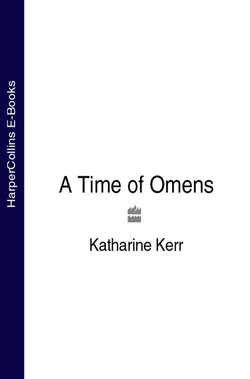Читать книгу A Time of Omens - Katharine Kerr - Страница 6
A Note on the Pronunciation of Deverry Words
ОглавлениеThe language spoken in Deverry is a member of the P-Celtic family. Although closely related to Welsh, Cornish, and Breton, it is by no means identical to any of these actual languages and should never be taken as such.
Vowels are divided by Deverry scribes into two classes: noble and common. Nobles have two pronunciations; commons, one.
A as in father when long; a shorter version of the same sound, as in far, when short.
O as in bone when long; as in pot when short.
W as the oo in spook when long; as in roof when short.
Y as the i in machine when long; as the e in butter when short.
E as in pen.
I as in pin.
U as in pun.
Vowels are generally long in stressed syllables; short in unstressed. Y is the primary exception to this rule. When it appears as the last letter of a word, it is always long whether that syllable is stressed or not.
Diphthongs generally have one consistent pronunciation.
AE as the a in mane.
AI as in aisle.
AU as the ow in how.
EO as a combination of eh and oh.
EW as in Welsh, a combination of eh and oo.
IE as in pier.
OE as the oy in boy.
UI as the North Welsh wy, a combination of oo and ee.
Note that OI is never a diphthong, but is two distinct sounds, as in carnoic, (KAR-noh-ik).
Consonants are mostly the same as in English, with these exceptions:
C is always hard as in cat.
G is always hard as in get.
DD is the voiced th as in thin, or breathe, but the voicing is more pronounced than in English. It is opposed to TH, the unvoiced sound as in th or breath. (This is the sound that the Greeks called the Celtic tau.)
R is heavily rolled.
RH is a voiceless R, approximately pronounced as if it were spelled hr in Deverry proper. In Eldidd, the sound is fast becoming indistinguishable from R.
DW, GW, and TW are single sounds, as in Gwendolen or twit.
Y is never a consonant.
I before a vowel at the beginning of a word is consonantal, as it is in the plural ending -ion, pronounced yawn.
Doubled consonants are both sounded clearly, unlike in English. Note, however, that DD is a single letter, not a doubled consonant.
Accent is generally on the penultimate syllable, but compound words and place names are often an exception to this rule.
I have used this system of transcription for the Bardekian and Elvish alphabets as well as the Deverrian, which is, of course, based upon the Greek rather than the Roman model. In spite of the ridiculous controversy still continuing in certain university circles, I see no reason to confuse the ordinary reader with the technical method of Elvish transcription in common use among linguists and scholars. Anyone who wishes to learn this system may of course refer to the standard works upon the subject available from the University of Aberwyn Press; the average reader of popular fiction would no doubt rather forego such a formidable experience. I am surprised at the stubbornness of certain professors of Elvish, to say nothing of a certain Elvish professor, which has forced me to append such a self-evident remark to these notes. One can only assume that these persons are under-employed by their academic institutions if they have the leisure to write scurrilous articles about contemporary novelists rather than devoting themselves to their proper areas of expertise.
